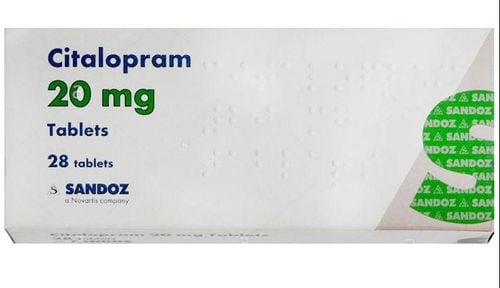This is an automatically translated article.
Citalopram is used to treat depression. This medication can help improve your energy and feelings of well-being. Citalopram may also be used to treat certain other mental illnesses.1. The effect of the drug Citalopram
Citalopram belongs to a class of drugs called selective serotonin reuptake inhibitors (SSRIs), which work to restore the balance of serotonin in the brain.Citalopram is indicated in the following cases:
Depression in the early stages and maintenance treatment to prevent recurrence. Panic disorder with or without agoraphobia. Citalopram is contraindicated in the following cases:
People with hypersensitivity to citalopram, escitalopram or any of its ingredients. The patient has been treated (within the last 2 weeks) or is being treated with intravenous monoamine oxidase inhibitors (MAOIs) or linezolid, methylene blue. The dose of antidepressant Citalopram for adults in each case is as follows:
Treatment of depression:
Dose of 20mg/day x 1 time/day. Review and adjust citalopram dose within 3–4 weeks of initiation of therapy and appropriate clinical assessment. If there is still poor response after several weeks of treatment with the recommended dose, the dose may be increased to a maximum of 40 mg/day. Treat for a minimum of 6 months to ensure cessation of symptoms of depression. Treatment of panic disorder:
Start with 10 mg/day, then increase in 10 mg increments depending on the patient's response to the recommended dose of 20–30 mg/day, up to a maximum dose of 40 mg. /day. Initial treatment with citalopram is usually effective after 2–4 weeks. A full treatment response can take up to 3 months to take effect. The patient then needs to continue treatment for several months. Citalopram is not recommended for use in children and adolescents under 18 years of age.
For the elderly: Reduce the dose of Citalopram to 10–20 mg/day.
For patients with hepatic impairment:
Start with 10mg/day for the first 2 weeks in patients with mild to moderate hepatic impairment. Depending on the patient's response, the dose may be increased to a maximum of 20 mg/day. Caution and careful dose adjustment are required in patients with severe hepatic impairment. Citalopram is to be taken orally, once a day, in the morning or evening, regardless of the meal.

Thuốc Citalopram giúp khôi phục lại sự cân bằng của serotonin trong não
2. What to do when overdose or forget to take Citalopram?
Symptoms of citalopram overdose may include convulsions, tachycardia/slow heart rate, drowsiness, prolongation of the QT interval on the electrocardiogram, coma, vomiting, tremors, increased/lower blood pressure, cardiac arrest, syndrome serotonin syndrome, dizziness, mydriasis, torsades de pointes, agitation, sweating, hypoventilation, cyanosis, hyperoxia, ventricular arrhythmias, atrial arrhythmias.
Currently there is no specific antidote to citalopram overdose. Treat symptomatically and supportively, maintain good ventilation, and monitor the patient's ECG and vital signs until stable.
Consider giving activated charcoal to adults who have taken more than 5 mg/kg citalopram within 1 hour. Osmotic laxatives (sodium sulfate) and gastric lavage should also be considered.
If patient is not awake, must be intubated. Control seizures in patients with intravenous diazepam if seizures are frequent and persistent.
If you forget to take a dose, take it as soon as you remember. However, if you remember it is almost time for your next dose, skip the missed dose and take your next dose at the scheduled time.
Please dial HOTLINE for more information or register for an appointment HERE. Download MyVinmec app to make appointments faster and to manage your bookings easily.













